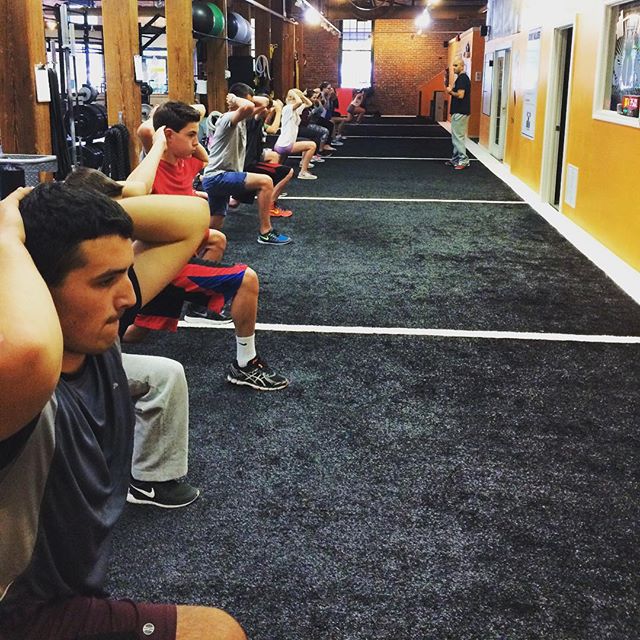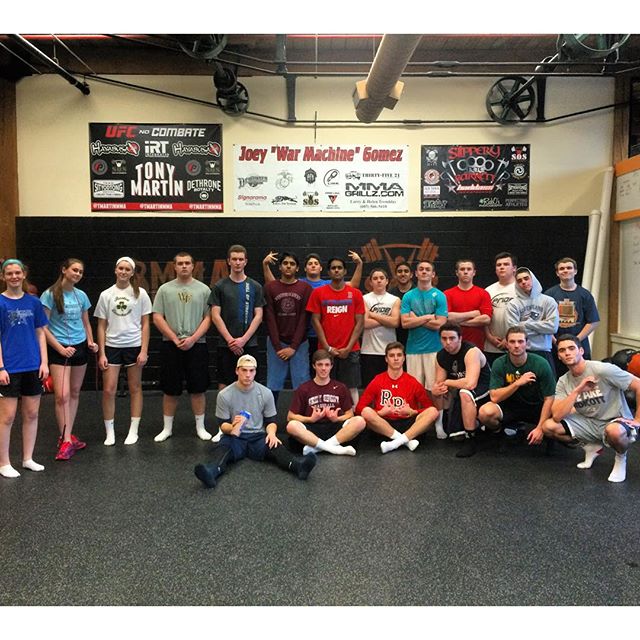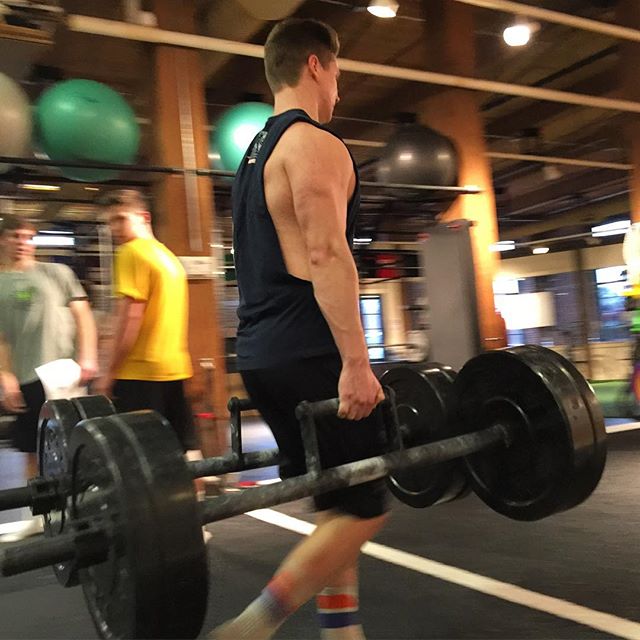In-season training improves performance and generally keeps kids healthier. I’ve even written on the subject a few times, going in-depth on the ins and outs of in-season training.
I spend countless hours coaching our athletes, correcting issues from past injuries and training them to utilize as much horse-power and gas mileage as possible. They are beyond prepared for their sports season.

Unfortunately, while I know what I’m saying is resonating with our athletes, parents and coaches, sometimes a conversation with a parent ends like this.
“You don’t have to tell me all the benefits of in-season training. I was a very good soccer player myself back in the day. I would have been a collegiate athlete if I didn’t tear my knee up, so I totally get it.
In-season training is imperative to staying healthy, but we just don’t have the time and my kid’s team practices so much during the week. You know how it is with homework too. Kids these days just have no time.”
Uh huh…
I’ve learned the importance of in-season training is very clear. Yup, it’s relatively simple for parents, coaches and athletes to understand why they should continue to train in-season.
The problem isn’t that people think training in-season is a bad idea. It’s that most people find more reasons they can’t or shouldn’t train to rationalize why they don’t.
Give them 10 reasons they should and they have 11 reasons they can’t!
Okay – so you get the general idea of why you should train in-season. You don’t need anymore of the science supporting in-season training. Instead, let’s discuss the 3 biggest reasons you can’t train in-season:
- You don’t have the time
- You don’t have the energy
- You don’t have the money
TIME – ENERGY – MONEY.
Hmmmph. Similar things we hear from adults about exercising, right?
Here is why having no time, no energy or money is no problem. Is it me or does that sound like a t-shirt you would buy on vacation and never wear?
You Don’t Have Time
As a student athlete, now is the time to learn how to manage your time. I know you have a lot going on.
Between group games of Xbox Live and staying up on the latest viral Vine videos, it’s a struggle to finish that English poem you need to write. I get it – you’re over-stressed and there is just no possible way you can even imagine squeezing in training two hours a week on top of everything else.
Training for the first week of the season and then not continuing to keep your strength sharp, makes about as much sense as pooping with your pants on.
Here is the hard truth. I know you don’t have time, but you need to make time and it’s not really all that difficult to do.
Properly training in-season takes about 2 hours a week. In 12 seconds, I can come up with a handful of ways you can squeeze two hours of week from your “busiest schedule ever.”
1. Stop watching TV while you do your homework.
2. Turn the music off in the shower. You’re in there way too long anyways. Get in and get it done.
3. Be pro-active. Use the weekend to get yourself in a better position for the week. This is a great life lesson that you’ll need later anyway!
4. Spend less time on social media. Your Instagram page is not that impressive anyway. 😉
5. Maintain a healthy life balance. When your winter schedule consists of JV basketball during the week, indoor lacrosse on Sundays, a session with a math tutor on Monday nights and band practice with your buddies on Saturday, you’re stretching yourself too thin! If your sport is important to you, commit to what’s important and postpone some of the other things until the off-season. This will help keep you happy and healthy!
Being a competitive athlete is not about convenience. You don’t achieve athletic greatness by taking the easy road. If you want to be a standout athlete, you’ll need to put in the time.
Life advice: you get out of it, what you put in.
You Don’t Have the Energy
Trust me I know your coach is a crazy person! Practices are INSANE. Lets face it, you’re a #Warrior on that #DailyGrind because you know if there is #NoPainNoGain.
You’re totally right, you have no energy to train in-season – it’s impossible!
Brace yourself for a thunderbolt of life changing information: in-season training focuses on recovery and tissue rejuvenation. (I should say proper in-season training.)
Sounds nice, doesn’t it?
After you’re done scoring ginos (that’s hockey talk for you) on the ice, it’s a pretty good idea to get some recovery time in. I know, you can’t make that happen. You’re literally falling asleep on the foam roller like Sid the Sloth.
Let’s dig into my bag of tricks and pull out a couple of solutions to your problem.
1. Get to sleep earlier. Saying “goodnight” to your boyfriend once instead of 30 times will save you 20 minutes right there!
2. Eat better. During your in-season, you should focus on healthy eating habits and make sure you’re consuming enough calories. For most athletes, you should try consuming a few more (quality) calories to see if it helps your energy level! Add in an extra PB and J and see what happens. 😉
3. Get better quality rest. Turn the TV off while you sleep and get more out of your night’s rest.
4. Take ice baths or hot tubs (just beware of Pseudomonas-induced hot tub folliculitis… my fiancé is a medical nerd). Toss some Epsom salts in the tub, add a couple of rubber duckies and come out feeling fresh! Bonus – you will SLEEP better.
You Don’t Have the Money
Unless your financial situation has changed, I’d argue that your perception of the product has changed, not your bank account. Despite all of the information available on the importance of in-season training, the belief remains that in-season training is less important than pre-season training.
Hmmmm, a perception issue disguised as a financial issue. Nice try!
Now, let’s discuss the money issue more in-depth and I’ll tell you why I’m not buying it, at least not for our athletes at SOS.
1. The lower rate of our annual COMPETE sports performance membership saves you enough money each year to pay for your entire in-season of training! Yep, our annual athletes get their in-season training for free. We’re literally giving you what you need!
2. Parents are willing to spend a small fortune to keep their children safe and injury-free. Do you know how much a custom knee brace costs? I’ll tell you…about $700-$1,000 each. That’s more than 5 months worth of training at SOS. Wouldn’t you rather spend your money on injury prevention than injury repairs?
3. Proper training is an investment in your health and allows for academic and financial opportunities way beyond high school and college. One example: athletics can be a doorway into a better school with potential scholarships for you. Guess when scouts will be watching you? In-season! In-season training has positive effects on your performance, which gains interest from college scouts. Interest from scouts gives you a financial bargaining chip towards a better future. Problem solved.

Take Aways
I’m pretty relaxed most of the time. However, I’m tired of hearing athletes talk themselves out of in-season training.
While the benefits are usually understood, the feelings that you have no time, no energy and no money can be hard to overcome. Rather than using time, energy and money excuses and barriers to training properly, work towards viewing in-season training as an opportunity.
If you’re still having trouble with time, what habits can you change to make more time for what’s really important? If you find yourself struggling with energy, ask yourself if your in-season schedule is really the only thing that is draining your batteries. If you money is the issue, perhaps the value you’re placing on training is misguided.
In-season is not the time to ignore the little things. Continue training and keep yourself healthy so you can enjoy everything you’ve worked so hard for during the off-season!
I’ve addressed the importance of in-season training in both these articles below:

One Comment
Comments are closed.